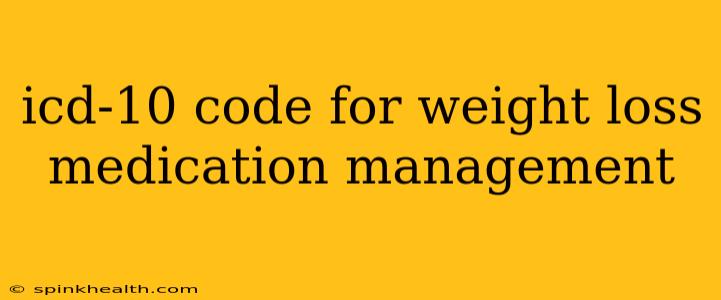The quest for a healthy weight is a journey many undertake, and sometimes, medical intervention in the form of weight-loss medication becomes necessary. But what about the coding? Finding the correct ICD-10 code for documenting this management can be tricky. Let's unravel the complexities and shed light on this important aspect of medical billing and record-keeping. The truth is, there isn't one single, universally applicable ICD-10 code for "weight loss medication management." Instead, the appropriate code depends heavily on the reason for the medication and the patient's underlying condition.
Understanding the Nuances: Why There's No Single Code
The ICD-10 system focuses on diagnosing specific medical conditions, not on treatments themselves. While a physician uses medication to manage weight loss, the code needs to reflect the reason for prescribing that medication. Is it for obesity? Is it for a related metabolic disorder like type 2 diabetes? The diagnosis drives the code, not the treatment.
Common Underlying Conditions and Their ICD-10 Codes
Here’s where things get clearer. Let's explore some common underlying conditions that might lead to the prescription of weight-loss medication and their corresponding ICD-10 codes:
E66 - Obesity:
This is the most straightforward scenario. If the primary reason for prescribing weight-loss medication is obesity itself, then the appropriate code would likely fall under the E66 category, encompassing various levels of obesity based on body mass index (BMI). The specific sub-code will depend on the patient's BMI and any associated complications.
E11 - Type 2 Diabetes Mellitus:
Weight loss is often a crucial part of managing type 2 diabetes. If the weight-loss medication is prescribed to help control blood sugar levels in a patient with type 2 diabetes, the primary code should reflect the diabetes diagnosis (E11) rather than the weight loss itself.
E78 - Other and unspecified disorders of lipid metabolism:
High cholesterol or triglycerides are often tackled through lifestyle changes including weight loss. If medication is prescribed to address these lipid metabolic disorders, the appropriate code will fall under E78. The specific sub-code will depend on the nature of the lipid disorder.
Other Metabolic Disorders:
Several other metabolic disorders can benefit from weight loss. These conditions each have their own ICD-10 codes, which would be the primary codes used in this context. Examples include:
- Metabolic Syndrome: Codes related to specific components of metabolic syndrome might be used. No single code encompasses the entire syndrome.
- Hypothyroidism: Weight gain is a common symptom. If weight-loss medication is part of managing hypothyroidism, the code for hypothyroidism would be the primary code.
How to Determine the Correct Code: A Step-by-Step Approach
- Identify the primary diagnosis: What is the underlying medical condition prompting the need for weight-loss medication?
- Consult the ICD-10 manual or a reliable online resource: Find the specific code that matches the diagnosis. Remember that sub-codes exist to specify the severity or type of condition.
- Consider comorbidities: The patient might have multiple conditions. All relevant diagnoses should be coded.
- Consult with a medical coding specialist: For complex cases or uncertainties, it's best to seek professional guidance to ensure accurate coding.
Importance of Accurate Coding
Accurate ICD-10 coding is crucial for several reasons:
- Accurate reimbursement: Incorrect coding can lead to denied or delayed payments.
- Data analysis and research: Accurate codes contribute to valuable epidemiological data.
- Public health monitoring: Data helps track trends and develop effective health policies.
This information is intended for educational purposes only and is not a substitute for professional medical coding advice. Always consult the official ICD-10 coding manual and seek professional guidance when necessary. The ever-evolving nature of medical coding necessitates staying updated with the latest guidelines and revisions.

